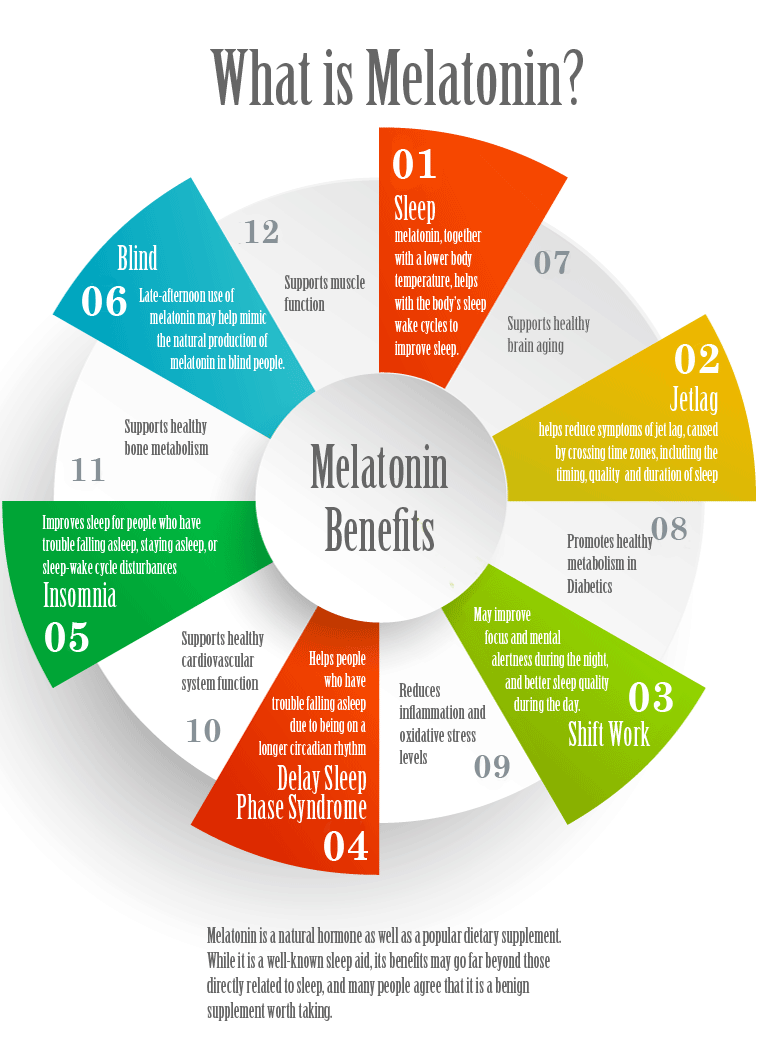Melatonin and Your Sleep Wake Cycle
What Is Melatonin?
Melatonin is a natural hormone that has been found not only in animals, but also in bacteria, algae, fungi, and plants. (1)Melatonin appears to be related to sleep. The National Center for Complementary and Integrative Medicine explains that melatonin production in your body increases in the evening when it is dark, and decreases during the day in response to daylight.(2)
Melatonin works in four ways: (3)
- Binding to receptors in the plasma membrane, or your cell walls, as part of your body’s cellular communication system.
- Binding calmodulin and similar proteins, which interfere with calcium binding in the intracellular space and are necessary for proper nervous system signaling and muscle function.
- Through an antioxidant effect.
- By binding to orphan nuclear receptors, which are linked to retinoid (vitamin A) receptors and affect the brain.
The blood-brain barrier is a natural defense mechanism that your body has to protect the brain against harmful substances such as environmental pollutants and metabolic byproducts that could be toxic. Melatonin is among a limited number of substances that can cross the blood-brain barrier, and concentrations are higher in the brain than in the circulating blood, according to information published in “Current Neuropharmacology.”(4)
Melatonin can support healthier levels of brain neurotransmitters, specifically of serotonin, according to an article in Medscape.(5) Serotonin production rises in association with improved mood and reduced anxiety, and is low in disorders such as alcoholism, overeating, and other addictive behaviors.
Main Benefits of Melatonin
Promotes Healthier Sleep
Melatonin is a natural hormone that is used as a sleep aid. This natural alternative can be welcome to people who are wary of medications that can be habit-forming or have potentially severe side effects. It is commonly used to treat primary sleep disorders, or those conditions in which disordered is the problem in itself. Secondary sleep disorders, or conditions in which sleep is impaired as a result of a separate health condition, seem less affected by melatonin.(6) According to an article in “Neurochirugerie,” melatonin couples a lower body temperature with the body’s sleep-wake cycles to improve sleep.(7)
Getting Over Jet Lag
Jet lag occurs when you travel across time zones and your body is not yet accustomed to the new zone. You may have trouble falling asleep or staying asleep for long, or you might not feel rested when you wake up. The National Center for Complementary and Integrative Medicine reports that melatonin may help people reduce symptoms of jet lag.(8) This may include both severity and duration.(9)

Better Alertness in Shift Workers
Shift workers can have trouble falling or staying asleep, partly due to alterations in the light they see compared to people who are awake during the day and asleep at night. Shift workers who take melatonin may have improved focus and mental alertness during the night, while at work, and better sleep quality during the day, while they are off. (10)
Delayed Sleep Phase Syndrome
Delayed sleep phase syndrome is a condition in which you have trouble falling asleep, often due to being on a longer circadian rhythm. (11)The hope of melatonin is to reduce the time it takes to fall asleep.
Insomnia
Nearly everyone has suffered from some small degree of insomnia at some point; the term refers to general trouble with sleep, such as trouble falling asleep, staying asleep, or sleep-wake cycle disturbances. Insomnia that is severe or long-lasting is more than simply annoying; it can interfere with your well-being. The National Center for Complementary and Integrative Medicine says that some people take melatonin to improve sleep.(12)
Promotes More Regular Sleep-Wake Cycles in the Blind
Sleep disorders are common among individuals who are completely blind, likely related to lack of light reaching the area of the brain called the suprachiasmatic nuclei within the hypothalamus, according to “Frontiers in Neurology.” Late-afternoon use of melatonin may help mimic the natural production of melatonin in response to darkness following suppression during daylight, which does not occur among individuals who are blind.(13)

Other Health Benefits of Melatonin
Melatonin acts on multiple organs throughout the body, with receptors located in the brain, skin, platelets, fat cells or adipocytes, kidney, certain arteries, and other organs.(14) Melatonin may promote health aside from ways relating to sleep.
Supports Healthy Brain Aging
A small amount of cognitive decline is normal during the aging process, but excessive amounts are not. Severe dementia, Alzheimer’s disease, and other neurodegenerative conditions such as amyotrophic lateral sclerosis (ALS), or Lou Gehrig’s disease, have been associated with lower levels of melatonin.(15)
Promotes Healthy Metabolism in Diabetics
Type 2 diabetes is a metabolic disorder with high blood sugar and insulin resistance. Poor control of blood sugar over time can lead to complications such as heart disease, diabetic retinopathy, and kidney disease. Melatonin may support lower blood sugar levels and a healthier insulin response if you have diabetes.[(16)
Reduces Inflammation and Oxidative Stress Levels
Many chronic diseases, including heart disease and diabetes and its complications, are linked to chronic inflammation and oxidative stress. Melatonin may support healthier levels of inflammation and oxidative stress through healthier (lower) levels of harmful free radicals in your body(17) and promoting healthier levels of free radicals and other reactive oxygen species in your body, as well as the enzymes that promote antioxidant activity to fight harmful oxidation. (18) A healthy liver from reduced oxidation is another goal.(19)
Supports Healthy Cardiovascular System Function
Your cardiovascular system includes your heart and blood vessels, and risk factors for heart disease and stroke include high blood pressure, low blood levels of HDL cholesterol, and high total cholesterol levels in your blood. Melatonin supplementation can support healthier blood vessel function and lipid metabolism, as suggested by research among individuals with type 2 diabetes published in the journal, “Clinical Nutrition.”(20)
Supports Healthy Bone Metabolism
Your bones are a constant state of flux or turnover. Cells called osteoblasts build up bone mineral, while osteoclasts stimulate bone resorption or breakdown of bone material. Bone building is faster than resorption until your 20’s, and the goal for the remainder of your life is to minimize the amount of net bone loss you have in order to prevent osteoporosis, or bone thinning and a high risk of fractures, as you age.
Melatonin is thought to improve the balance of bone metabolism by increasing bone formation and reducing resorption.(21) One trial found that supplementing for a year led to the increased bone mineral density of the hip and lumbar region of the spine among postmenopausal women with osteopenia, which is a risk factor for osteoporosis.(22)
Supports Muscle Function
If you are an active person, you compete in sports, or you have ever experienced sports or similar injury, you know the value of muscle healing and recovery. Melatonin may support healthier inflammatory responses and restorative effects in muscles after strenuous exercises or during the healing process after a sports injury.(23)The natural anti-inflammatory effects of melatonin may also pose fewer side effects than powerful anti-inflammatory medications such as steroids.

Ways to Increase Melatonin
Natural Production
You can support melatonin production and use in your body by knowing a little bit about it. Here are some tips to naturally increase in melatonin amount and effects:
- Aim to get some sunlight every day.
- Try to be in a dark place before bedtime to stimulate melatonin production.
- Exercise daily, but at least a few hours before bedtime to give your body temperature time to decrease so you can sleep better.
- Consume foods with melatonin, such as tart cherry extract, oatmeal, tomatoes, walnuts, and bananas, preferably in the evening or a few hours before you go to bed.
Melatonin Supplements
Melatonin supplements are available over-the-counter. You can take them orally or in a topical cream. Ask your doctor how much you should take, and how frequently.
Dosing
Different research studies have investigated different doses of melatonin. WebMD reports doses of 0.5 to 8 mg at bedtime for five days can be common, while a similar dose for up to 9 months has been used for trouble falling asleep. (24) For sunburn, research has been done on topical gels containing 0.05% to 2.5% melatonin, applied within 15 minutes of or up to 4 hours after sunburn. (25)
The amount of melatonin you should take, and how often you should take it, can depend on individual factors such as why you want to take it, your body size, and any other medications or health conditions that could be relevant. Ask your doctor for advice if you are unsure about how much to take.
A Low-Risk Supplement
Compared to many medications and some nutritional supplements, melatonin is a relatively low-risk supplement. It has a low risk of dependency, and you may be less likely to wake up groggy after taking melatonin than you might be if you took prescription or synthetic sleep aids.
Cautions with Melatonin
Melatonin does carry some risks, especially among certain populations. People have reported dizziness, headaches, and irritability. Also, since it is a sleep aid, you should be sure not to plan to operate heavy machinery or drive within several hours of taking melatonin. Melatonin can interact with caffeine.
Melatonin can also interfere with certain medications. Be sure to tell your doctor if you are taking oral contraceptives or are on diabetes medications. Some anticoagulant medications, including certain over-the-counter drugs, can interact with melatonin.
Melatonin may be riskier for certain individuals. Women who are pregnant or breastfeeding should be cautious, and women who are trying to become pregnant should know that melatonin can interfere with ovulation and increase the risk of infertility.(26) It can also interfere with blood sugar levels, and individuals with diabetes should be cautious about taking melatonin.
Melatonin can also have unintended consequences for other chronic conditions. For example, it can increase immune responses and raise concerns related to autoimmune disorders,(27) as well as increase inflammation related to painful conditions such as rheumatoid arthritis.(28)
As you should before taking any supplement, discuss melatonin with your doctor before starting it. Be sure to bring up any medications you are taking, the reasons why you might want to take melatonin and any health conditions you may be worried about. For your own safety, choose a brand that is well-known so you can be confident in its purity and quality.(29)
Why can’t I find my favorite sleep supplements?
You may have noticed that your favorite sleep supplements are no longer available to purchase. That is because some sleep supplements contain an ingredient called, phenibut or 4-amino-3-phenylbutyric acid HCl. The FDA has made a decision that phenibut or 4-amino-3-phenylbutyric acid HCl in synthetic forms is now being reclassified because it does not meet the definition of a dietary ingredient and cannot be used in dietary supplements.
Some of the popular products that contain phenibut include Kavinace and Kavinace Ultra PM by NeuroScience Inc, Phenitropic, Phenitropic PM and Phenitropic Ultra PM by Biotics Research, and Gabacore by Apex Energetics. These manufacturers intend on reformulating these products and that should take two to four months.
In the meantime, we recommend the following sleep support supplements as alternatives:
Seriphos
Sedalin
Nardova
Zizyphus 18
Melatonin
If you have any questions about this, please do not hesitate to call our clinic to speak to one of our practitioners regarding this.
References
1 Tan DX. Melatonin and Brain. Curr Neuropharmacol. 2010 Sep; 8(3): 161. doi: 10.2174/157015910792246263.
2 National Center for Complementary and Integrative Medicine. Melatonin. National Institutes of Health. 2015.
3 Emet M, Ozcan H, Lutfu Ozel L, Yayla M, Zekai Halici Z, Hacimuftuoglu A. A Review of Melatonin, Its Receptors and Drugs.
4 Tan DX. Melatonin and Brain. Curr Neuropharmacol. 2010 Sep; 8(3): 161. doi: 10.2174/157015910792246263.
5 Malhotra S, Sawhney G, Pandhi P. The Therapeutic Potential of Melatonin: A Review of the Science. Medscape. 2004.
6 Costello RB, Lentino CV, Boyd CC, O’Connell ML, Crawford CC, Sprengel ML, Deuster PA. The effectiveness of melatonin for promoting healthy sleep: a rapid evidence assessment of the literature. Nutr J. 2014 Nov 7;13:106. doi: 10.1186/1475-2891-13-106.
7 Claustrat B, Leston J. Melatonin: Physiological effects in humans. Neurochirurgie. 2015 Apr-Jun;61(2-3):77-84. doi: 10.1016/j.neuchi.2015.03.002. Epub 2015 Apr 20.
8 National Center for Complementary and Integrative Medicine. Melatonin. National Institutes of Health. 2015. https://nccih.nih.gov/health/melatonin
9 Costello RB, Lentino CV, Boyd CC, O’Connell ML, Crawford CC, Sprengel ML, Deuster PA. The effectiveness of melatonin for promoting healthy sleep: a rapid evidence assessment of the literature. Nutr J. 2014 Nov 7;13:106. doi: 10.1186/1475-2891-13-106. https://nutritionj.biomedcentral.com/articles/10.1186/1475-2891-13-106
10 Costello RB, Lentino CV, Boyd CC, O’Connell ML, Crawford CC, Sprengel ML, Deuster PA. The effectiveness of melatonin for promoting healthy sleep: a rapid evidence assessment of the literature. Nutr J. 2014 Nov 7;13:106. doi: 10.1186/1475-2891-13-106. https://nutritionj.biomedcentral.com/articles/10.1186/1475-2891-13-106
11 WebMD. Melatonin.
12 National Center for Complementary and Integrative Medicine. Melatonin. National Institutes of Health. 2015. https://nccih.nih.gov/health/melatonin
13 Salva MAQ, Hartley S, Léger D, Dauvilliers YA. Non-24-Hour Sleep–Wake Rhythm Disorder in the Totally Blind: Diagnosis and Management. Published online 2017 Dec 18. doi: 10.3389/fneur.2017.00686. PMCID: PMC5741691 https://www.ncbi.nlm.nih.gov/pmc/articles/PMC5741691/ Front Neurol. 2017; 8: 686.
14 Emet M, Ozcan H, Lutfu Ozel L, Yayla M, Zekai Halici Z, Hacimuftuoglu A. A Review of Melatonin, Its Receptors and Drugs. https://www.ncbi.nlm.nih.gov/pmc/articles/PMC4970552/
15 Emet M, Ozcan H, Lutfu Ozel L, Yayla M, Zekai Halici Z, Hacimuftuoglu A. A Review of Melatonin, Its Receptors and Drugs.
16 Raygan F, Ostadmohammadi V, Bahmani F, Reiter RJ, Asemi Z. Melatonin administration lowers biomarkers of oxidative stress and cardio-metabolic risk in type 2 diabetic patients with coronary heart disease: A randomized, double-blind, placebo-controlled trial. https://www.ncbi.nlm.nih.gov/pubmed/29275919
17 Dehdashtian E, Mehrzadi S, Yousefi B, Hosseinzadeh A, Reiter RJ, Safa M, Ghaznavi H, Naseripour M. Diabetic retinopathy pathogenesis and the ameliorating effects of melatonin; involvement of autophagy, inflammation and oxidative stress. Life Sci. 2018 Jan 15;193:20-33. doi: 10.1016/j.lfs.2017.12.001. Epub 2017 Dec 5.
18 Raygan F, Ostadmohammadi V, Bahmani F, Reiter RJ, Asemi Z. Melatonin administration lowers biomarkers of oxidative stress and cardio-metabolic risk in type 2 diabetic patients with coronary heart disease: A randomized, double-blind, placebo-controlled trial. https://www.ncbi.nlm.nih.gov/pubmed/29275919
19 Li Y1, Yang Y, Feng Y, Yan J, Fan C, Jiang S, Qu Y. A review of melatonin in hepatic ischemia/reperfusion injury and clinical liver disease. Ann Med. 2014 Nov;46(7):503-11. doi: 10.3109/07853890.2014.934275. Epub 2014 Jul 18.
20 Raygan F, Ostadmohammadi V, Bahmani F, Reiter RJ, Asemi Z. Melatonin administration lowers biomarkers of oxidative stress and cardio-metabolic risk in type 2 diabetic patients with coronary heart disease: A randomized, double-blind, placebo-controlled trial.
21 Swanson CM, Kohrt WM, Buxton OM, Everson CA, Wright KP Jr., Orwoll ES, Shea SA. The importance of the circadian system & sleep for bone health. Metabolism. 2017 Dec 9. pii: S0026-0495(17)30337-2. doi: 10.1016/j.metabol.2017.12.002. [Epub ahead of print]
22 Amstrup AK, Sikjaer T, Heickendorff L, Mosekilde L, Rejnmark. Melatonin improves bone mineral density at the femoral neck in postmenopausal women with osteopenia: a randomized controlled trial. J Pineal Res, 59 (2015), pp. 221-229
23 Maarman GJ, Reiter RJ. Melatonin therapy for blunt trauma and strenuous exercise: A mechanism involving cytokines, NFκB, Akt, MAFBX and MURF-1.
24 WebMD. Melatonin.
25 WebMD. Melatonin.
26 WebMD. Melatonin.
27 Hardeland R. Melatonin in aging and disease -multiple consequences of reduced secretion, options and limits of treatment. Aging Dis. 2012 Apr; 3(2):194-225.
28 Forrest CM, Mackay GM, Stoy N, Stone TW, Darlington LG. Inflammatory status and kynurenine metabolism in rheumatoid arthritis treated with melatonin. Br J Clin Pharmacol. 2007 Oct; 64(4):517-26.
29 WebMD. Melatonin.



